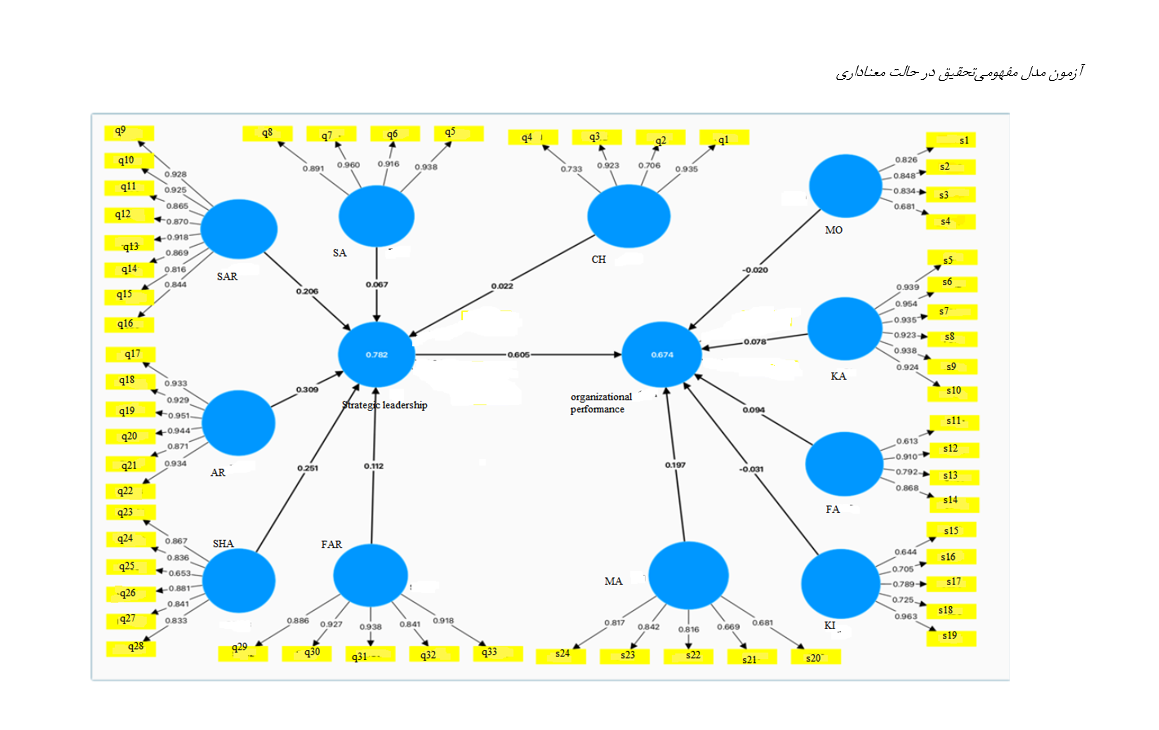تأثیر رهبری استراتژیک بر عملکرد سازمانی: شواهدی از مؤسسات تابعه وزارت علوم عراق
کلمات کلیدی:
مدیریت استراتژیک, رهبری استراتژیکچکیده
هدف پژوهش حاضر بررسی تأثیر رهبری استراتژیک بر عملکرد سازمانی در مؤسسات تابعه وزارت علوم کشور عراق است، با تمرکز بر نقش تعیینکننده آن در محیطهای پیچیده و رقابتی. این مطالعه از نظر هدف، کاربردی و از نظر ماهیت، توصیفی-همبستگی است که بهصورت میدانی اجرا شده است. جامعه آماری شامل ۲۲۰۰ نفر از کارکنان مؤسسات وزارت علوم عراق بود که با استفاده از جدول مورگان، ۳۵۰ پرسشنامه استاندارد (پرسشنامه رهبری استراتژیک لیر و همکاران، و عملکرد سازمانی ادام و همکاران) بهصورت تصادفی ساده توزیع گردید. برای تحلیل دادهها از نرمافزارهای SPSS و SmartPLS استفاده شد و شاخصهایی مانند پایایی ترکیبی، روایی همگرا، تحلیل عاملی تأییدی و معادلات ساختاری مورد ارزیابی قرار گرفت. نتایج مدل معادلات ساختاری نشان داد که رهبری استراتژیک اثر مستقیم، مثبت و معناداری بر عملکرد سازمانی دارد (β = 0.605، p < 0.001). مقدار GOF مدل برابر 0.626 و سایر شاخصهای برازش ازجمله CFI (0.946) و RMSEA (0.0198) نشاندهنده برازش مناسب مدل بودند. همچنین، ضریب همبستگی پیرسون بین رهبری استراتژیک و عملکرد سازمانی مثبت و قوی گزارش شد (r = 0.802). بر اساس یافتهها، رهبری استراتژیک یکی از عوامل کلیدی ارتقاء عملکرد سازمانی در نهادهای دولتی است. این پژوهش اهمیت توسعه سبکهای رهبری مبتنی بر آیندهنگری، ارزشمحوری و شایستهسالاری را در پاسخ به پیچیدگی محیطهای آموزش عالی عراق برجسته میسازد.
دانلودها
مراجع
Abdeen, H., De‐Pablos‐Heredero, C., Martínez, C. C., & Botella, J. L. M. (2025). Strategic Leadership and Its Impact on Dynamic Capabilities and Sustainable Competitive Advantages. Management Decision. https://doi.org/10.1108/md-07-2024-1682
Asif, M. (2020). Strategic leadership and ambidextrous learning: Exploring the role of dynamic capabilities and intellectual capital. International Journal of Quality and Service Sciences, 12(1), 1-14. https://doi.org/10.1108/IJQSS-03-2019-0034
Baharuddin, B. (2024). Strategic Leadership in Education: Navigating Change in Digital Learning Environments. International Journal of Educational Narratives, 2(6), 494-504. https://doi.org/10.70177/ijen.v2i6.1744
Deylami-Moazi, O., & Mokhtari-Baie-Kolaie, M. (2022). Analyzing Strategic Leadership for Organizational Transformation and Employee Engagement (Case Study: Agricultural Banks in Tehran). [Journal Name Not Provided], 4(14), 54-65. https://patjournal.smtc.ac.ir/article-1-300-fa.html
Ellinger, A. D., & Ellinger, A. E. (2021). Providing strategic leadership for learning: optimizing managerial coaching to build learning organizations. The Learning Organization, 28(4), 337-351. https://doi.org/10.1108/TLO-05-2020-0070
Gholami, H., Au - Saman, M., Sharif, S., & Zakuan, N. (2024). A CRM strategic leadership towards sustainable development in student relationship management: SD in higher education. https://doi.org/10.1080/08841241.2021.1975185
Gu, S. (2023). The Effect of Strategic Leadership on Retention and Creativity of Employee in Chinese Universities: Career Aspiration as a Mediator. International Journal of Education and Humanities, 9(2), 214-220. https://doi.org/10.54097/ijeh.v9i2.9936
Ho, G. K. S., Lam, C., & Law, R. (2023). Conceptual framework of strategic leadership and organizational resilience for the hospitality and tourism industry for coping with environmental uncertainty. Journal of Hospitality and Tourism Insights, 6(2), 835-852. https://doi.org/10.1108/JHTI-09-2021-0242
Khairullah, S. A. (2025). Implementing Artificial Intelligence in Academic and Administrative Processes Through Responsible Strategic Leadership in the Higher Education Institutions. Frontiers in Education, 10. https://doi.org/10.3389/feduc.2025.1548104
Kianfar, F., & Dorris, J. (2021). Analyzing Strategic Leadership for Organizational Transformation and Employee Engagement (Participation-Interaction). Journal of Modern Research Approaches in Management and Accounting, 5(16), 172-183. https://majournal.ir/index.php/ma/article/view/667
Metz, S. (2020). The Future of Strategic Leadership. The US Army War College Quarterly: Parameters, 50(2), 9. https://doi.org/10.55540/0031-1723.1020
Nurcahyo, A. (2024). The Effect of Strategic Leadership and Environmental Management on Firm Performance Mediated by Competitive Advantage in the Mining Industry. Dinasti International Journal of Economics Finance & Accounting, 5(3), 1828-1838. https://doi.org/10.38035/dijefa.v5i3.3182
Poursadeq, N., & Qaraei-Ashtiani, M. R. (2023). The Impact of Strategic Leadership on Organizational Performance with the Mediating Role of Innovation Ambidexterity (Case Study: A Defense Organization of the Armed Forces). Interdisciplinary Studies in Strategic Knowledge, 13(52), 25-45. https://smsnds.sndu.ac.ir/article_2484.html?lang=en
Putra, R. A., Mukhlis, & Musnadi, S. (2021). The Influence of Strategic Leadership Style and Cognitive Behavior on Work Motivation and Its Impact on Organizational Performance in the Pidie Education Office. International Journal of Scientific and Management Research, 04(05), 214-224. https://doi.org/10.37502/ijsmr.2021.4514
Saleh, M. H., & Al-Hakimi, M. A. (2024). Linking strategic intelligence, strategic leadership, strategic planning, and strategic thinking and business performance: The moderating effect of strategic flexibility. Future Business Journal, 10, 31. https://doi.org/10.1007/s43621-024-00670-
Samimi, M., Cortes, A. F., Anderson, M. H., & Herrmann, P. (2022). What is Strategic Leadership? Developing a Framework for Future Research. The Leadership Quarterly, 33(3), 101353. https://doi.org/10.1016/j.leaqua.2019.101353
Seyed Naqavi, M., Torabi Kalateh Qazi, A., Rezaei Mirqaed, M., Hosseinpour, D., & Ghorbanizadeh, V. (2023). Strategic Leadership Capabilities of Public Sector Managers Holding Political Positions.
Shirini, N. (2021). Examining the Impact of Strategic Leadership on Organizational Effectiveness in Iranian Knowledge-Based Companies. Journal of Applied Educational Leadership, 2(4), 65-78. https://ael.uma.ac.ir/article_1617.html
Suriyankietkaew, S., & Kungwanpongpun, P. (2021). Strategic Leadership and Management Factors Driving Sustainability in Health-Care Organizations in Thailand. Journal of Health Organization and Management, 36(4), 448-468. https://doi.org/10.1108/jhom-05-2021-0165
Swarnalatha, M., Mukherjee, S., Mahabub, M. M., Sen, P. C., & Agrawal, P. N. (2025). The Role of Exponential Technologies to Propel Disruptive Innovation Under the Mediating Influence of Strategic Leadership. 407-436. https://doi.org/10.4018/979-8-3693-7175-6.ch017
Torabi-Kalateh Ghazi, A., Seyed Naghavi, M., Rezaei-Mirghaed, M., Hosseinpour, D., & Ghorbanizadeh, V. (2023). Strategic Leadership Capabilities of Public Managers in Political Positions. Human Resource Management Research, 15(1), 185-228. https://hrmj.ihu.ac.ir/article_207953.html?lang=en
Zhang, X., & Chen, T. (2024). Strategic Leadership: Driving Innovation and Competitive Advantage. Strat. Manag. Insights, 1(6), 14-19. https://doi.org/10.70088/cypfcw62

دانلود
چاپ شده
ارسال
بازنگری
پذیرش
شماره
نوع مقاله
مجوز
حق نشر 2025 Fatemeh Qaid Swady Almashhadi (Author); Mohammad Faryabi; Sajjad Naghdi, Seyed Samad Hosseini (Author)

این پروژه تحت مجوز بین المللی Creative Commons Attribution-NonCommercial 4.0 می باشد.










